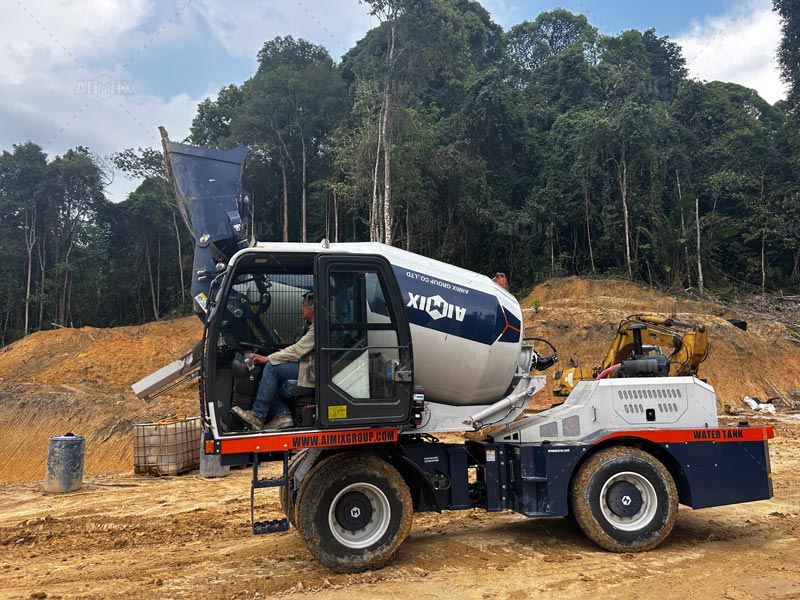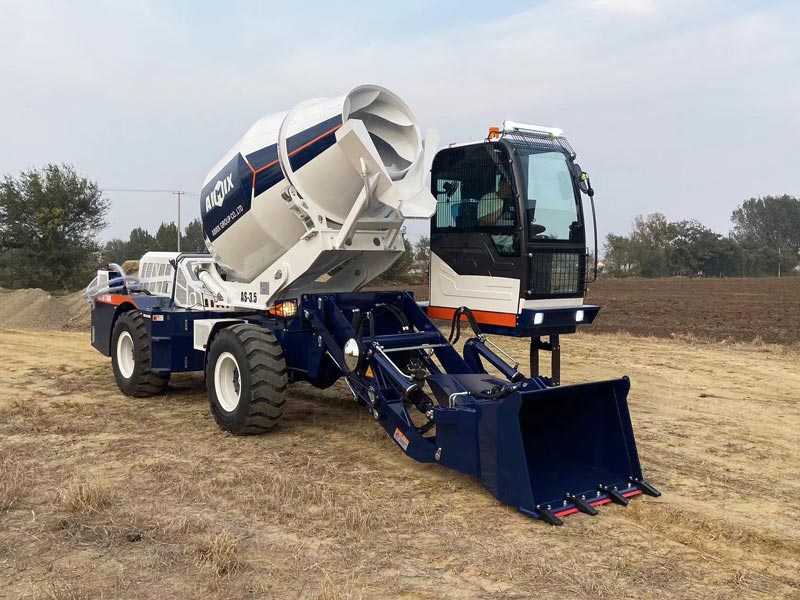Proper maintenance keeps your mobile concrete mixer working efficiently for years. Whether you own a self-loading concrete mixer or a standard mobile concrete mixer, regular care prevents breakdowns and costly repairs. This guide covers essential maintenance tips to maximize performance and lifespan.
We’ll discuss daily checks, cleaning routines, lubrication needs, and troubleshooting common issues. Follow these practices to ensure smooth operations on every job site.

1. Daily Inspection Routine
Start each workday with these quick checks:
-
Check fluid levels (engine oil, hydraulic fluid, coolant)
-
Inspect tires for proper inflation and damage
-
Examine mixing drum for buildup or wear
-
Test lights and signals for visibility
-
Listen for unusual noises during startup
Address minor issues immediately before they become major problems. A well-maintained mobile concrete mixer saves time and money.
2. Cleaning After Every Use
Concrete residue hardens quickly, so clean the mixer promptly:
-
Rinse the drum thoroughly with water immediately after pouring
-
Use a scrub brush for stubborn buildup
-
Flush the chute and discharge system to prevent clogs
-
Wipe down controls to prevent sticky buttons
-
Remove spilled concrete from the frame and wheels
For self-loading concrete mixers, pay extra attention to the loading hopper and conveyor system.
3. Lubrication Schedule
Moving parts need regular lubrication to prevent wear:
-
Grease drum rollers every 50 operating hours
-
Lubricate pivot points on the discharge chute weekly
-
Check hydraulic fittings monthly
-
Apply grease to the mixing blades as needed
Use manufacturer-recommended lubricants for best results. Proper lubrication reduces friction and extends component life.

4. Engine and Hydraulic System Care
The power system needs special attention:
-
Change engine oil every 250 hours or as specified
-
Replace air filters when dirty
-
Check hydraulic hoses for leaks or cracks
-
Monitor coolant levels to prevent overheating
A well-maintained engine ensures reliable performance in your mobile concrete mixer.
5. Winter Maintenance Tips
Cold weather requires extra precautions:
-
Drain all water after use to prevent freezing damage
-
Store indoors when possible
-
Use winter-grade fluids for easier cold starts
-
Warm up the engine before heavy mixing
These steps protect your equipment during offseason storage.
6. Professional Servicing
Schedule professional maintenance annually for:
-
Comprehensive system checks
-
Advanced diagnostics
-
Component replacements
-
Safety inspections
Technicians can spot problems you might miss during routine maintenance.
7. Operator Training
Proper use prevents unnecessary wear:
-
Train operators on correct loading procedures
-
Avoid overloading the mixer capacity
-
Use proper mixing speeds
-
Follow shutdown procedures
Well-trained crews maintain equipment better and improve efficiency.
Conclusion
Regular maintenance keeps your mobile concrete mixer or self-loading concrete mixer running smoothly. Follow these key practices:
-
Inspect daily before use
-
Clean thoroughly after each job
-
Lubricate moving parts regularly
-
Service engines and hydraulics as scheduled
-
Address problems immediately
Consistent care reduces repair costs and extends equipment life. Need quality replacement parts or service for your concrete mixer? Contact our team for expert support.

Leave a Reply